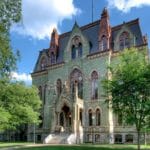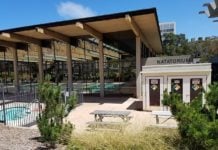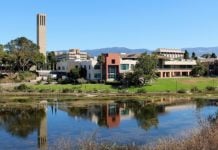Wake Forest University is one of the oldest higher learning institutions in North Carolina. Originally conceived as the Wake Forest Manual Labor Institute, the school was rechartered as Wake Forest College four years later.
Wake Forest is currently situated in Winston-Salem – approximately 100 miles from its original location in the city of Wake Forest. Admission is competitive, with the college accepting only one of every three regular decision applicants.
Many noteworthy figures have served as Wake Forest faculty members, including author and activist Maya Angelou, editor and news host Melissa Harris-Perry, and Anthony Atala, who is recognized for his trailblazing work in organ growth.
About 99% of classes at Wake Forest have fewer than 50 students, and an 11:1 teacher-to-student ratio creates an ideal context for developing strong mentoring relationships with professors.
It’s easy to overlook a school like Wake Forest University. Students who are particularly interested in study abroad opportunities, interdisciplinary approaches to their studies, and long-enduring campus traditions should take the time to review the school’s most popular majors, student organizations, and campus assets.
Keep reading to learn what makes Wake Forest stand out among other schools.
What Majors & Academics Are Wake Forest Known For?
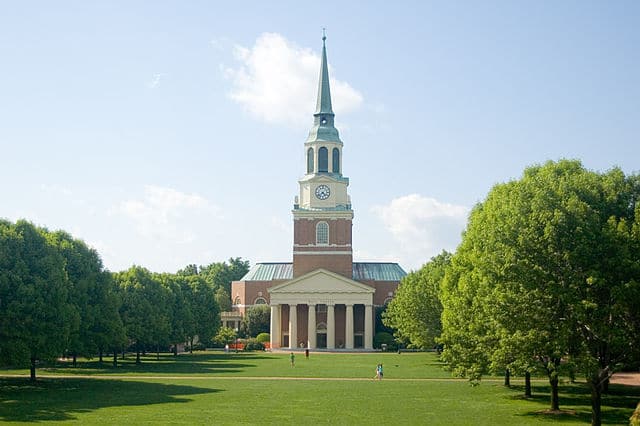
The most popular majors at Wake Forest are political science, economics, and business. Political science majors who pursue a minor in Latin-American studies may complete the 5-year cooperative BA/MA program at Georgetown University.
Showing strong support for an interdisciplinary approach to problem-solving, Wake Forest offers several interdisciplinary minors.
In addition to a Latin-American and Latino Studies minor, political science majors can alternatively pursue a minor in Global Trade and Commerce Studies, Russian and East European Studies, or Women’s and Gender Studies.
Economics majors also benefit from an array of interdisciplinary courses at their disposal, such as Economics of Health and Medicine.
Students can even enroll in a College Fed Challenge course, where they work in small teams to analyze the economic conditions of a theoretical context and design a monetary policy solution.
Wake Forest’s business program maintains a reputation for being one of the best in the country. The School of Business’s part-time MBA program has ranked #1 in North Carolina for the last twelve years, according to U.S. News & World Report. The school itself is ranked #13 of the nation’s best business programs.
Undergraduates can select from four concentrations within the B.S. degree – Business and Enterprise Management (BEM) is a unique concentration that emphasizes leadership and critical thinking and grants students the freedom to customize their course pathway based on their interests, whether they lie in nonprofit management, marketing, or new business incubation.
Is Wake Forest a Good School?
Wake Forest is ranked #28 by U.S. News – the school has a positive reputation because 94.5% of its graduates secure employment or enrollment in graduate school within a year of matriculating.
Students gravitate to a school like Wake Forest for its interdisciplinary approach to learning. The Open Curriculum option grants a select number of students the opportunity to co-create a course of study with an advisor.
Speaking of opportunities, Wake Forest has a robust study abroad program that is ranked #33 in the nation.
The Tropical Biodiversity and Environmental Journalism in Peru program challenges student participants to analyze the intersectionality of environmental, human, and biological factors impacting climate change and how to report on various media topics.
Students admitted to Wake Forest can expect to enter a community of ambitious and intellectually curious students – 61% of admitted applicants ranked in the top 5% of their graduating classes, while 87% ranked within the top 10%.
While Wake Forest is a competitive private university, they are committed to meeting 100% of admitted students’ demonstrated financial needs. Additionally, the school offers merit-based scholarships to approximately 3% of first-year applicants. Unsurprisingly, the school ranks #24 in the nation for the best value.
For example, Carswell Scholarships are awarded to five students who demonstrate strong leadership skills and academic achievement – the scholarship covers a year of tuition, room and board, and a $3400 stipend for personal expenses.
These esteemed scholars are prompted to apply for research or study abroad funding during their time at Wake Forest.
Wake Forest Traditions
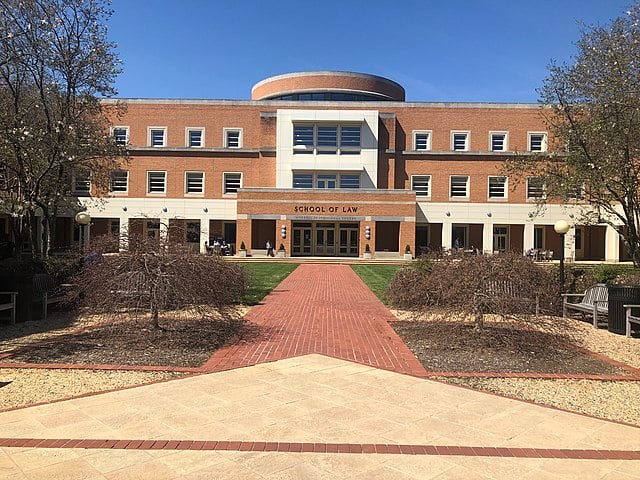
Many students think of on-campus traditions as one of the fondest parts of their Wake Forest experience, starting with Homecoming and Family Weekend in the fall.
Alumni and students enjoy participating in the pep rally around a large bonfire on Davis Field, tailgating before the Homecoming football game, attending the President’s Ball, and introducing their family members to college life.
Another fall favorite is Hit the Bricks for Brian Piccolo – a campus-wide relay race that has been raising funds for the Brian Piccolo Cancer Fund Drive since 2004.
In 2021, the event surpassed its fundraising record by securing over $202,000 in donations!
Project Pumpkin is one of the most entertaining philanthropic events of the fall. Nearly 1,000 Wake Forest students volunteer to run carnival games on the Quad and go trick-or-treating with schoolchildren in the residence halls.
Money raised goes directly to supporting the Wake Forest Freedom School, a summer literacy program for 3rd through 8th-grade students.
D.E.S.K. is the spring’s response to Project Pumpkin. In this yearly event, representatives from many of Wake Forest’s clubs design desks for underprivileged elementary school students in the Winston-Salem community.
Many of Wake Forest’s most beloved traditions revolve around music and dance. Springfest – which takes place in the last week of April – attracts students with live music and dancing. The Wake N’ Shake dance marathon raises funds for the Brian Piccolo Cancer Research Fund.
One of the newer traditions at Wake Forest is the Reynolda Film Festival. Cinema fanatics will love attending various workshops, film screenings, and panel discussions featuring illustrious figures like Spike Lee.
Prominent Clubs & Extracurricular Activities at Wake Forest
Wake Forest students can choose to get involved in over 250 clubs! Greek life is prevalent at Wake Forest, comprising about 40-50% of the student population, though there is a strong social scene outside of fraternities and sororities.
A special aspect of the Wake Forest Greek life recruiting system is that all recruits must have completed at least one full semester of college.
Thus, the spring semester witnesses the majority of fraternity and sorority recruitment.
Athletics are also extremely popular at Wake Forest – more than half of the students are involved in intramural sports.
There are traditional offerings as well as more unique teams for spikeball, free throw tournaments, and street hockey.
Prefer to get your competitive fix off the field? The Wake Debate team has entered the semifinal round of the National Debate Tournament six times, made the finals on two occasions, and won the tournament twice.
The Lilting Banshee Comedy Troupe commands the stage with improv performances parodying Wake Forest social life and current events.
Speaking of current events, the Old Gold & Black is Wake Forest’s student-run newspaper, “covering the campus like magnolias.” Student writers contribute stories on topics focused on news, opinions, sports, and life.
One of the most popular clubs at Wake Forest is the Student Union, a group that offers over 200 programs throughout the year, ranging from trivia nights and guest lectures to week-long festivals and concerts.
What Sports Are Wake Forest Known For?
Despite being the smallest school in the Atlantic Coast Conference (ACC), Wake Forest boasts one of its largest trophy collections! The school has won 53 ACC championships and nine NCAA Division I championships overall.
The Wake Forest men’s basketball team has produced several successful athletes who went on to play in the NBA, including Billy Packer, Chris Paul, and Muggsy Bogues, the shortest professional basketball player in the United States at 5’3”.
The women’s field hockey team has won three national championships and four ACC championships in the last two decades.
Three-time Olympian and captain of the Olympic field hockey teams – Lauren Crandall Liska – is the first Wake Forest athlete in history to get inducted into Team USA Field Hockey’s Hall of Fame.
The men’s golf team has also accumulated an impressive trove of accolades. Its history is marked by 19 ACC championships and three NCAA championships. Sophomore player Michael Brennan was recently awarded a Second Team All-America Honors by Golfweek.
Regularly making appearances in the national title match is the Wake Forest men’s soccer team. Not only does the team demonstrate excellence on the field, but they are also dedicated to making a positive impact in their community.
The team was named the 2021-2022 Helper Helper Team Community Service Challenge Champion after recording almost 1,000 hours of community service.
Why Wake Forest?
Wake Forest provides an ideal learning environment for students interested in collaboration, interdisciplinary problem-solving, and hands-on learning experiences.
Enrolling almost 8,000 students, the student population is small enough to create a sense of familiarity while sizable enough to warrant ample activities, events, and opportunities to get involved in campus life and leadership.
Wake Forest students are perceived as well-rounded. Many students are involved in athletics and/or philanthropic pursuits, and a significant portion opts to venture outside of their comfort zones by studying abroad in a new country.
The school’s motto – Pro Humanitate – translates to “For Humanity,” and feels ingrained into every aspect of academic and extracurricular life.
Students also adore Wake Forest for its top-notch faculty, remarking that professors truly seem as committed to their students’ progress as they are to their research.
The ideal teacher-to-student ratio is conducive to more student-driven discussion, and most departments offer various opportunities for students to collaborate with faculty members.
Students interested in global affairs shouldn’t count out this often underestimated Southern Ivy in their search for the ideal college. A college experience at Wake Forest is sure to unlock possibilities that students wouldn’t have access to at other schools.




